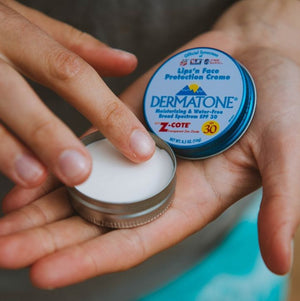
Mineral vs Traditional Sun Protection
Sunscreen is an essential part of our skincare routine, summer and winter, if you're outdoors make sure you consider sun protection for your skin. Our Dermatone range provides both Mineral and traditional or chemical sun protection options, to find out the differences between these read on... If you want to find out more regarding what to look for in a sunscreen in general check out our Sun Protection Crash Course where we run you through all the specifics so you can make an informed decision.
Mineral Sun Protection
Mineral sunscreens are also known as physical or natural sunscreens. They use minerals like zinc oxide and titanium dioxide to create a barrier that sits on top of the skin and reflects UV rays before they penetrate your skin. Mineral sunscreens provide important broad-spectrum protection against both UVA and UVB rays.
One of the significant advantages of mineral sunscreens is that they're less likely to cause skin irritation or allergic reactions because they contain natural ingredients. They're also better for the environment since they don't contain harmful chemicals that can potentially harm marine life. Mineral sunscreens are ideal for people with sensitive skin or skin allergies.
However, mineral sunscreens can be challenging to apply since they tend to be thicker and can leave a white cast on the skin. Some people may not like the way mineral sunscreens look on their skin, which can be a deal-breaker for them.
Traditional/Chemical Sunscreens:
Traditional or chemical sunscreens, use chemicals to absorb UV rays that penetrate your skin and convert them into heat, which then dissipates and is released from the skin. Chemical sunscreens are easier to apply since they tend to be thinner, more lightweight, and absorb into the skin quickly.
Chemical sunscreens can be more convenient for everyday use, but they're not ideal for people with sensitive skin or skin allergies. Some people may experience skin irritation or allergic reactions to the chemicals used in these sunscreens. Additionally, some of the chemicals used in traditional sunscreens have been shown to be harmful to the environment and not so gentle on your skin. As a rule its good to avoid oxybenzone as an ingredient. Fortunately our entire Dermatone range is oxybenzone-free!
Which one to choose?
So, which sunscreen should you choose? It depends on your skin type and personal preferences. If you have sensitive skin or are prone to skin allergies, mineral sunscreens may be a better choice for you. If you're looking for convenience and ease of application, traditional/chemical sunscreens may be a better choice.
It's important to note that no sunscreen can provide 100% protection against UV rays. Regardless of which sunscreen you choose, make sure to apply it correctly and reapply it every few hours to ensure that you're getting maximum protection against UV rays. Additionally, consider wearing protective clothing and finding shade whenever possible.
For more information on what to look for in general check out our Sun Protection Crash Course for more of a deep dive into specifics. Or check out our full Deramtone Sun Protection here for both Mineral and Traditional options.







Leave a comment